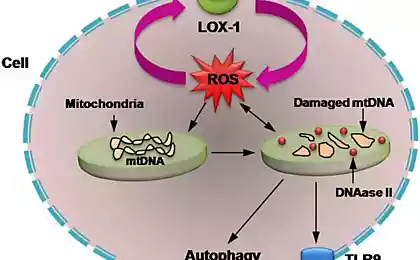263
Synthetic Antioxidant Vitamins: Should You Take It? Biochemists versus pharmacists.
The “vitamin” and “axidantomania” observed today, which has become extremely widespread in all civilized countries, has more than half a century of its development. It may seem strange to many people whether to take vitamins or not. Everyone, even children, knows that they are very useful. And it really is. But, although the benefits of vitamins for our health, no one doubts, with their use, as it turned out, not everything is as simple and unambiguous as it is commonly believed. Let's take a closer look at this.
Increased interest in vitamins arose in the 50s of the last century, when scientists managed to find that some of the oxygen during energy processes turns into very aggressive reactive forms, which were called free radicals. A few years later, the famous American biologist Denham Harman put forward his famous free radical theory of aging. According to this theory, free oxygen radicals, whose levels increase with age, can get out of control and damage various intracellular structures – proteins, cell membranes, right down to DNA itself.

This theory also well explained the occurrence of almost all age-related diseases of mankind: cardiovascular diseases, diabetes, cataracts, immunosuppression, neurodegeneration, etc. Scientists estimate that over 70 years of life in the human body produces about 1 ton of free radicals of oxygen. And although they perform many important physiological functions, especially in terms of the immune and reproductive systems, such a huge number of radicals could cause a person great harm.
To counteract their negative effects, we have a special antioxidant protection system. How effective it is when everything is in order in the body, everyone can judge by the following figures: out of a million superoxide oxygen radicals formed from enzyme intracellular antioxidants, no more than four escape. It was during the study of this antioxidant system that scientists were able to find out that a number of vitamins already known at that time (tocopherol, vitamin A, ascorbic acid) have antioxidant properties. If you logically combine the possible great harm of free radicals and the ability of vitamins to successfully combat this, then it is not difficult to draw an obvious conclusion that suggests itself and which was soon made.
In 1970, another famous American scientist, professor of chemistry at Stanford University, twice Nobel laureate Linus Pauling wrote an article “The evolution and need for ascorbic acid”. In it, he argued that a person, due to the peculiarities of his modern diet, chronically and in large volume, loses one of the most important vitamins for our body - vitamin C. According to Pauling, such a menacing defect of ascorbic acid is caused by evolutionary changes in human eating habits. Having moved in the course of their development from a plant-based diet characteristic of primates to a more high-calorie diet consisting of meat, fish, fats and other highly concentrated sources of calories, people began to consume very little vitamins because of this.
The conclusion that Pauling made was obvious: modern nutrition, consisting only to a small extent of plant foods, turns into a constant vitamin deficiency for us. And in order to correct this catastrophic situation, in his opinion, it is necessary to make it a rule to supplement your diet daily with a synthetic form of ascorbic acid.
Only after the death of L. Pauling in 1994, who himself took large doses of ascorbic acid and lived 93 years, began a large-scale revision of his theories. It turned out that along with the questionable and unproven benefits in large doses of vitamin C, there are many side effects, such as the formation of kidney stones. It was also found that increased intake of vitamin C turned it from an antioxidant into a prooxidant: instead of fighting free radicals, it, on the contrary, contributed to their appearance.
After the appearance of these data, several high-profile lawsuits took place, including in the Supreme Court of the European Union, which banned the release of vitamins in ultra-large dosages without reliable scientific confirmation. And "ascorbinomania" gradually began to disappear.
But, the beginning was made, and the great excitement around vitamins got its next logical continuation. Now scientists and pharmacists have taken on vitamins A and E. In the early 80s, Western biologists began experiments on rodents to determine the effect of large doses of vitamin E on free radical processes, various pathologies and overall life expectancy. The data obtained during these studies were so contradictory that they did not give any possibility to draw any definite conclusions. It was like horoscopes printed in different publications. In some researchers, mice that received vitamin E improved their performance on all counts and even extended their lives, in others everything happened exactly the opposite: vitamin E did not affect the life expectancy of mice, and also caused severe side effects that led to pathologies. Only in the simplest organisms like nematode worms, the use of vitamin E showed good results, prolonging their life.
Despite this, pharmaceutical companies in the West, selectively based on only positive data, began to produce synthetic vitamin E as a fortifying and preventive agent. The release of capsules from 100 mg to 1000 and more began. In the United States in the early 90s, vitamin E was sold in pharmacies for $ 400 million. Uncontrolled and unsupported by research, the use of vitamin E lasted for more than two decades, until, finally, large-scale studies were conducted that showed the obvious harm of unreasonable intake of this vitamin.
Similar work has been done with vitamin A (retinol), as well as its predecessor, b-carotene. And here, too, it was not possible to see such results that would unequivocally speak about the benefits of prophylactic intake of this vitamin.
In 2003, American scientists from the Laboratory of Atherosclerosis and Metabolic Research at Davis Medical Center (Sacramento, California) conducted a meticulous analysis of three dozen studies on the effect of vitamins A, E and ascorbic acid on the occurrence of cardiovascular diseases. Their findings are outlined in an article with the eloquent title “Antioxidants and atherosclerosis”. Not to throw out the child with water, were quite disappointing: no significant reduction in these diseases against the background of taking vitamins was found. “Thus, the results of clinical trials of antioxidants were disappointing.” It is obvious that antioxidant mixtures from vitamins have no benefit in the prevention of cardiovascular disease, concluded the American researchers.
In 2007, the Journal of the American Medical Association published the work of Dr. Goran Bjelakovic and his Swedish and Italian colleagues, summarizing the results of 68 large-scale studies involving a total of 250,000 people. All of them for a long time took with food synthetic vitamin supplements in order to trace their impact on human health.
The results of this work were discouraging and even sensational: taking b-carotene, vitamins A, E and ascorbic acid did not have any positive effect on the health of participants in these studies. These vitamins not only did not prolong the healthy life of the subjects, but, on the contrary, increased the mortality rate among them: taking b-carotene increased mortality by 7%, and vitamins A and E by 16 and 4%, respectively. And only vitamin C in this respect was neutral, without affecting the life and health of people taking it.
They found that synthetic vitamins, which were thought to have beneficial antioxidant properties, sometimes acted in the opposite way. They could suppress the programmed process of cellular self-destruction, apoptosis, in the reborn tumor cells, after which they did not die, but began to grow rapidly.
As it turned out, scientists at the beginning of studies with vitamins did not take into account that dangerous degenerate cells are removed from the human body with the direct participation of free radicals. They trigger a biochemical cascade of cellular “suicide” inside the cell as soon as there is a threat of genetic damage – one can say, they serve as a starting point, a trigger in the development of this protective process. And the antioxidant vitamins taken orally suppressed these radicals, because of which the reborn cells did not die. What this could turn out for the body, everyone understands. As we can assume, it is because of this that increased mortality was recorded in people taking vitamins.
Free radicals are also involved in other important internal processes in our body, they play a key role in neutralizing harmful microbes and bacteria. As it turned out, taken antioxidant vitamins can suppress these functions of immune cells.
How important free radicals are for our body can be judged by the work carried out by Russian biologists from Moscow State University, headed by N.I. Goldstein. They neutralized some volume of air from superoxide oxygen radicals by passing it between the two plates of the magnet. After that, the scientists pumped the purified air into the room with the experimental mice. It turned out that a completely clean atmosphere from radicals can be deadly: breathing such air, the mice died after two weeks. Although the word “radical” has a negative connotation in our minds and is associated with hooligans and terrorists, free radicals of oxygen, it seems, should not be treated completely negatively and deal with them in all ways.
This is how one of the most authoritative experts on free radicals, a Russian scientist, academician V.P. Skulachev, says: “In fact, reactive oxygen species are necessary for life.” In small quantities. For example, with their help, immune system cells kill harmful microbes. In addition, micro amounts of free radicals serve to transmit a number of signals from one cell to another, they are involved in some useful chemical reactions. If we flood the entire body with an antioxidant, then all these vital processes risk being strangled.
To sum up, Bjelakovic and his colleagues had to say: There are several possible explanations for the negative effect of antioxidant supplements on mortality. Although oxidative stress (i.e., stress caused by free radicals) may play a role in the pathogenesis of many chronic diseases, it can be a consequence of pathological conditions. By eliminating free radicals from the body, we will interfere with the main defense mechanisms, such as apoptosis, phagocytosis and detoxification. In order not to shake people’s faith in the beneficial properties of vitamins, the authors of this study had to emphasize that the results obtained relate exclusively to the synthetic form of vitamins and do not at all question the usefulness of their natural counterparts contained in products.
Subsequently, another unpleasant feature of the unjustified “preventive” intake of synthetic vitamins was found out. It turned out that they can reduce the benefits of exercise. In May 2009, the Journal of the National Academy of Sciences of the United States published an article by a group of German scientists from the Institute of Human Nutrition and the Institute of Clinical Chemistry and Laboratory Medicine of the University of Jena, headed by Professor Michael Ristov, entitled “Antioxidants prevent the effect of improving the health of exercise in people.” According to Dr. Ristov, they were able to establish that taken after exercise vitamins with antioxidant properties, namely vitamins C and E, significantly reduced the benefits of these exercises.
German researchers explained this unexpected effect as follows. During running, fitness or cycling, in the body against the background of increased oxygen consumption, there is a simultaneous increase in the production of free radicals. These radicals formed during sports activities have a positive effect on the body, training and strengthening its internal antioxidant system. Thus, it becomes stronger and better mobilized, able to respond faster and more effectively to the increase in free radicals during illness and old age. It’s like putting money away on a “black” day when you suddenly need more resources. If, after the gym, take antioxidant vitamins, the formed free radicals will be suppressed by them and there will be no training effect on the antioxidant system.
In addition, Ristov and his colleagues found that vitamins taken after exercise prevented the cells from improving their sensitivity to insulin. As we know today, exercise along with diet is the most important preventive tool in the fight against such an extremely common pathological phenomenon as insulin resistance (i.e. resistance) when cells stop responding to this hormone. This condition is characterized by a violation of glucose absorption by cells and the development against the background of this whole “bucket” of age-related diseases - such as atherosclerosis, obesity and diabetes.
As scientists know, the normal sensitivity of cells to insulin is so important that without it there is nothing to hope to live a long life. It has a direct link to good health and longevity – all of the centenarians studied were 100 years old and had very good cell sensitivity to insulin. Conversely, most people who died prematurely from heart attacks and strokes suffered from insulin resistance. Dr. Ristov’s group found that subjects who took vitamins C and E after exercise had no beneficial effects associated with insulin. Their susceptibility to this hormone remained at the same level. At the same time, in another control group that did not take vitamins after exercise, all the positive effects associated with insulin were evident.
Dr. Ristov and colleagues were forced to say, “All of our findings suggest that exercise enhances the influence of several molecular regulators of insulin sensitivity, regardless of a person’s previous state of fitness, and that this process is largely suppressed by antioxidants.”
Although all of the above should raise some concerns about improper intake of vitamins, in some cases, for example, in winter, their multivitamin complexes may well be beneficial. If your diet is well balanced and saturated with foods that contain a large amount of vitamins (such as vegetables and fruits), there is no special reason to supplement the diet with synthetic vitamins, apparently, there is no reason. In any case, some reasonable caution will not hurt here. And it is hardly necessary to rely too much on the tempting advertising promises of pharmaceutical companies, which need to pay regular dividends to their shareholders, rather than take care of our health.
Author of the article Alexey Rzheshevsky
Source: globalscience.ru
Increased interest in vitamins arose in the 50s of the last century, when scientists managed to find that some of the oxygen during energy processes turns into very aggressive reactive forms, which were called free radicals. A few years later, the famous American biologist Denham Harman put forward his famous free radical theory of aging. According to this theory, free oxygen radicals, whose levels increase with age, can get out of control and damage various intracellular structures – proteins, cell membranes, right down to DNA itself.

This theory also well explained the occurrence of almost all age-related diseases of mankind: cardiovascular diseases, diabetes, cataracts, immunosuppression, neurodegeneration, etc. Scientists estimate that over 70 years of life in the human body produces about 1 ton of free radicals of oxygen. And although they perform many important physiological functions, especially in terms of the immune and reproductive systems, such a huge number of radicals could cause a person great harm.
To counteract their negative effects, we have a special antioxidant protection system. How effective it is when everything is in order in the body, everyone can judge by the following figures: out of a million superoxide oxygen radicals formed from enzyme intracellular antioxidants, no more than four escape. It was during the study of this antioxidant system that scientists were able to find out that a number of vitamins already known at that time (tocopherol, vitamin A, ascorbic acid) have antioxidant properties. If you logically combine the possible great harm of free radicals and the ability of vitamins to successfully combat this, then it is not difficult to draw an obvious conclusion that suggests itself and which was soon made.
In 1970, another famous American scientist, professor of chemistry at Stanford University, twice Nobel laureate Linus Pauling wrote an article “The evolution and need for ascorbic acid”. In it, he argued that a person, due to the peculiarities of his modern diet, chronically and in large volume, loses one of the most important vitamins for our body - vitamin C. According to Pauling, such a menacing defect of ascorbic acid is caused by evolutionary changes in human eating habits. Having moved in the course of their development from a plant-based diet characteristic of primates to a more high-calorie diet consisting of meat, fish, fats and other highly concentrated sources of calories, people began to consume very little vitamins because of this.
The conclusion that Pauling made was obvious: modern nutrition, consisting only to a small extent of plant foods, turns into a constant vitamin deficiency for us. And in order to correct this catastrophic situation, in his opinion, it is necessary to make it a rule to supplement your diet daily with a synthetic form of ascorbic acid.
Only after the death of L. Pauling in 1994, who himself took large doses of ascorbic acid and lived 93 years, began a large-scale revision of his theories. It turned out that along with the questionable and unproven benefits in large doses of vitamin C, there are many side effects, such as the formation of kidney stones. It was also found that increased intake of vitamin C turned it from an antioxidant into a prooxidant: instead of fighting free radicals, it, on the contrary, contributed to their appearance.
After the appearance of these data, several high-profile lawsuits took place, including in the Supreme Court of the European Union, which banned the release of vitamins in ultra-large dosages without reliable scientific confirmation. And "ascorbinomania" gradually began to disappear.
But, the beginning was made, and the great excitement around vitamins got its next logical continuation. Now scientists and pharmacists have taken on vitamins A and E. In the early 80s, Western biologists began experiments on rodents to determine the effect of large doses of vitamin E on free radical processes, various pathologies and overall life expectancy. The data obtained during these studies were so contradictory that they did not give any possibility to draw any definite conclusions. It was like horoscopes printed in different publications. In some researchers, mice that received vitamin E improved their performance on all counts and even extended their lives, in others everything happened exactly the opposite: vitamin E did not affect the life expectancy of mice, and also caused severe side effects that led to pathologies. Only in the simplest organisms like nematode worms, the use of vitamin E showed good results, prolonging their life.
Despite this, pharmaceutical companies in the West, selectively based on only positive data, began to produce synthetic vitamin E as a fortifying and preventive agent. The release of capsules from 100 mg to 1000 and more began. In the United States in the early 90s, vitamin E was sold in pharmacies for $ 400 million. Uncontrolled and unsupported by research, the use of vitamin E lasted for more than two decades, until, finally, large-scale studies were conducted that showed the obvious harm of unreasonable intake of this vitamin.
Similar work has been done with vitamin A (retinol), as well as its predecessor, b-carotene. And here, too, it was not possible to see such results that would unequivocally speak about the benefits of prophylactic intake of this vitamin.
In 2003, American scientists from the Laboratory of Atherosclerosis and Metabolic Research at Davis Medical Center (Sacramento, California) conducted a meticulous analysis of three dozen studies on the effect of vitamins A, E and ascorbic acid on the occurrence of cardiovascular diseases. Their findings are outlined in an article with the eloquent title “Antioxidants and atherosclerosis”. Not to throw out the child with water, were quite disappointing: no significant reduction in these diseases against the background of taking vitamins was found. “Thus, the results of clinical trials of antioxidants were disappointing.” It is obvious that antioxidant mixtures from vitamins have no benefit in the prevention of cardiovascular disease, concluded the American researchers.
In 2007, the Journal of the American Medical Association published the work of Dr. Goran Bjelakovic and his Swedish and Italian colleagues, summarizing the results of 68 large-scale studies involving a total of 250,000 people. All of them for a long time took with food synthetic vitamin supplements in order to trace their impact on human health.
The results of this work were discouraging and even sensational: taking b-carotene, vitamins A, E and ascorbic acid did not have any positive effect on the health of participants in these studies. These vitamins not only did not prolong the healthy life of the subjects, but, on the contrary, increased the mortality rate among them: taking b-carotene increased mortality by 7%, and vitamins A and E by 16 and 4%, respectively. And only vitamin C in this respect was neutral, without affecting the life and health of people taking it.
They found that synthetic vitamins, which were thought to have beneficial antioxidant properties, sometimes acted in the opposite way. They could suppress the programmed process of cellular self-destruction, apoptosis, in the reborn tumor cells, after which they did not die, but began to grow rapidly.
As it turned out, scientists at the beginning of studies with vitamins did not take into account that dangerous degenerate cells are removed from the human body with the direct participation of free radicals. They trigger a biochemical cascade of cellular “suicide” inside the cell as soon as there is a threat of genetic damage – one can say, they serve as a starting point, a trigger in the development of this protective process. And the antioxidant vitamins taken orally suppressed these radicals, because of which the reborn cells did not die. What this could turn out for the body, everyone understands. As we can assume, it is because of this that increased mortality was recorded in people taking vitamins.
Free radicals are also involved in other important internal processes in our body, they play a key role in neutralizing harmful microbes and bacteria. As it turned out, taken antioxidant vitamins can suppress these functions of immune cells.
How important free radicals are for our body can be judged by the work carried out by Russian biologists from Moscow State University, headed by N.I. Goldstein. They neutralized some volume of air from superoxide oxygen radicals by passing it between the two plates of the magnet. After that, the scientists pumped the purified air into the room with the experimental mice. It turned out that a completely clean atmosphere from radicals can be deadly: breathing such air, the mice died after two weeks. Although the word “radical” has a negative connotation in our minds and is associated with hooligans and terrorists, free radicals of oxygen, it seems, should not be treated completely negatively and deal with them in all ways.
This is how one of the most authoritative experts on free radicals, a Russian scientist, academician V.P. Skulachev, says: “In fact, reactive oxygen species are necessary for life.” In small quantities. For example, with their help, immune system cells kill harmful microbes. In addition, micro amounts of free radicals serve to transmit a number of signals from one cell to another, they are involved in some useful chemical reactions. If we flood the entire body with an antioxidant, then all these vital processes risk being strangled.
To sum up, Bjelakovic and his colleagues had to say: There are several possible explanations for the negative effect of antioxidant supplements on mortality. Although oxidative stress (i.e., stress caused by free radicals) may play a role in the pathogenesis of many chronic diseases, it can be a consequence of pathological conditions. By eliminating free radicals from the body, we will interfere with the main defense mechanisms, such as apoptosis, phagocytosis and detoxification. In order not to shake people’s faith in the beneficial properties of vitamins, the authors of this study had to emphasize that the results obtained relate exclusively to the synthetic form of vitamins and do not at all question the usefulness of their natural counterparts contained in products.
Subsequently, another unpleasant feature of the unjustified “preventive” intake of synthetic vitamins was found out. It turned out that they can reduce the benefits of exercise. In May 2009, the Journal of the National Academy of Sciences of the United States published an article by a group of German scientists from the Institute of Human Nutrition and the Institute of Clinical Chemistry and Laboratory Medicine of the University of Jena, headed by Professor Michael Ristov, entitled “Antioxidants prevent the effect of improving the health of exercise in people.” According to Dr. Ristov, they were able to establish that taken after exercise vitamins with antioxidant properties, namely vitamins C and E, significantly reduced the benefits of these exercises.
German researchers explained this unexpected effect as follows. During running, fitness or cycling, in the body against the background of increased oxygen consumption, there is a simultaneous increase in the production of free radicals. These radicals formed during sports activities have a positive effect on the body, training and strengthening its internal antioxidant system. Thus, it becomes stronger and better mobilized, able to respond faster and more effectively to the increase in free radicals during illness and old age. It’s like putting money away on a “black” day when you suddenly need more resources. If, after the gym, take antioxidant vitamins, the formed free radicals will be suppressed by them and there will be no training effect on the antioxidant system.
In addition, Ristov and his colleagues found that vitamins taken after exercise prevented the cells from improving their sensitivity to insulin. As we know today, exercise along with diet is the most important preventive tool in the fight against such an extremely common pathological phenomenon as insulin resistance (i.e. resistance) when cells stop responding to this hormone. This condition is characterized by a violation of glucose absorption by cells and the development against the background of this whole “bucket” of age-related diseases - such as atherosclerosis, obesity and diabetes.
As scientists know, the normal sensitivity of cells to insulin is so important that without it there is nothing to hope to live a long life. It has a direct link to good health and longevity – all of the centenarians studied were 100 years old and had very good cell sensitivity to insulin. Conversely, most people who died prematurely from heart attacks and strokes suffered from insulin resistance. Dr. Ristov’s group found that subjects who took vitamins C and E after exercise had no beneficial effects associated with insulin. Their susceptibility to this hormone remained at the same level. At the same time, in another control group that did not take vitamins after exercise, all the positive effects associated with insulin were evident.
Dr. Ristov and colleagues were forced to say, “All of our findings suggest that exercise enhances the influence of several molecular regulators of insulin sensitivity, regardless of a person’s previous state of fitness, and that this process is largely suppressed by antioxidants.”
Although all of the above should raise some concerns about improper intake of vitamins, in some cases, for example, in winter, their multivitamin complexes may well be beneficial. If your diet is well balanced and saturated with foods that contain a large amount of vitamins (such as vegetables and fruits), there is no special reason to supplement the diet with synthetic vitamins, apparently, there is no reason. In any case, some reasonable caution will not hurt here. And it is hardly necessary to rely too much on the tempting advertising promises of pharmaceutical companies, which need to pay regular dividends to their shareholders, rather than take care of our health.
Author of the article Alexey Rzheshevsky
Source: globalscience.ru























